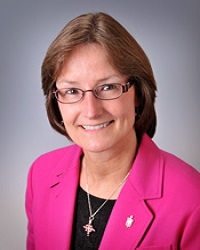
Bishop Sandra Steiner Ball
COURTESY WEST VIRGINIA CONFERENCE
When people join a United Methodist church, they make specific promises. Among them are to be loyal to Jesus Christ through the church, to do everything possible to strengthen the church's ministries and to participate faithfully in those ministries with their prayers, presence, gifts, service and witness.
Those vows, says Bishop Sandra Steiner Ball of the West Virginia Area, are the core of faithful stewardship.
"Living in community requires commitment, responsibility and accountability to and for all its members," she says. "This should inspire deep-rooted, foundational care for each other, as well as for our local and global communities. This is stewardship, and it is reflected in the vows each of us made when we joined the community of faith.
"Christ gave and gives abundantly. We have been blessed for the purpose of being a blessing to others."
Steiner Ball says stewardship, for her, is "a pathway for living a faithful life. It is about sharing the gifts God has given to us in a way that significantly impacts the way we live our lives."
For many others, however, living that faithful life can be difficult in a society that often places individual needs above the good of many.
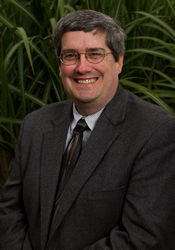
The Rev. Dan Dick
COURTESY WISCONSIN CONFERENCE
Living differently
The Rev. Dan Dick, director of connectional ministries for the Wisconsin Annual Conference, says three beliefs are critical to a congregation's faithful stewardship. The good of the whole is greater than any individual's; the congregation — not just the pastor — owns the church's mission and vision and supports it with energy, spirit and resources; and both clergy and laity equip, empower and enable all members daily to live their faith in the world.
Faithfulness also requires acknowledging that all wealth comes from God, Steiner Ball says, and "human beings are called to be the managers and multipliers of God's gifts."
As a personal vision for stewardship, Dick points to 1 Peter 4:10: "Like good stewards of the manifold grace of God, serve one another with whatever gift each of you has received" (NRSV).
Ultimately, Dick says, believers are called to be faithful to God and good stewards of "God's grace and God's will, manifest in us as gifts for ministry in and through the community to produce the fruit of the Spirit."
Money, he explains, is just one of those gifts. The Rev. Bill Barnes, co-lead pastor at St. Luke's United Methodist Church in Orlando, Fla., agrees.
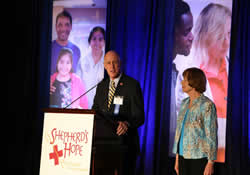
The Rev. Bill Barnes addresses a fund-raising event to benefit Shepherd's Hope, a multi-site medical clinic begun 17 years ago by St. Luke's United Methodist Church, Orlando, Fla. With him is Ruth McKeefery, the first volunteer president of Shepherd's Hope.
COURTESY ST. LUKE'S UMC
"Faithful stewardship is living into the unique giftedness that you are from God and the talents that you have from God and using them for the kingdom, even as you would use your money," he says. "It's money, but it's [also] time; it's serving with your spiritual gifts, offering yourself to others, being present with others in need."
Barnes says connecting the assets of a congregation — spiritual gifts, professional skills, resources of members — with the needs of a community is an integral component of faithful stewardship.
Members of St. Luke's, which has an average worship attendance of 1,890, used their assets to launch a clinic for the uninsured 17 years ago. Shepherd's Hope is now five regional clinics and a separately incorporated nonprofit organization. It has served 180,000 people for free, saving the lives of "scores and scores of people who had life-threatening illnesses and didn't know it," Barnes says.
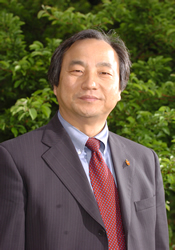
Bishop Hee-Soo Jung
COURTESY WISCONSIN CONFERENCE
Members also developed a tutoring program that helped increase the rankings of several elementary schools. One school rose from an F- to an A-school. The Orange County superintendent of schools adopted the church's model for the county. Now 110 schools there collaborate with faith communities.
God calls people of faith to be stewards of "all of life ... including our money, time, energy, spiritual gifts and commitment," says Bishop Hee-Soo Jung of the Wisconsin Area.
For Raúl Alegría, president of MARCHA, the national Hispanic caucus of The United Methodist Church, to say "all of life" is to be literal, to include people, all other living creatures and the planet itself.
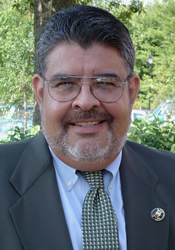
Raúl Alegría
COURTESY RAUL ALEGRIA
"We are called to be stewards of God's creation, of the persons God has placed in our lives or in our life faith journey," he says. "The environment and the natural world are God's creation. The people of our world are God's children, and we have a responsibility as stewards for them."
The Rev. Mark Stamm sees stewardship of the environment in practical terms.
"What message does it send when we take recycling seriously or when we are good stewards of water?" asks Stamm, professor of Christian worship at Southern Methodist University. "As a witness, let landscaping reflect the environment in which we live, so that we work in concert with what God has called forth in a particular geography. We have a stewardship problem when we want church and home lawns in Texas to look like lawns in Connecticut."
Using one's gifts for others as an act of faithfulness to God, all agree, is countercultural.
"To place the common good above individual and personal entitlement is countercultural," Dick says. "To see our material blessings as a means to an end, rather than an end in themselves, is countercultural. To see the church, not as the institution we attend for our own benefit, but as an institution that prepares and equips us to be the church in the world is countercultural."
How we learn it, live it, teach it
People learn to live for others, Steiner Ball says, by studying Christ's teaching.
"We are to live after the example of Christ," she says. "Christ gave and gives abundantly. We have been blessed for the purpose of being a blessing to others."
That belief, she says, prompts the question every member should ask: How will you use your spiritual and material gifts to work alongside others to build up this body of Jesus Christ?
The church provides an answer. "Christian community creates the space, the situation, where God's abundant blessings can be brought to light, so that we can be accountable to the image of God in which we are created by modeling our lives after the life of Christ," Steiner Ball says.
One of the best things the church can do, Stamm says, is give people a vision of a different way of life and permission to live it.
Membership vows offer a framework for that vision, offering accountability and growth, Dick says, but the church must be clear about the expectations behind those vows.
"An individual can say 'yes' to prayers, presence, gifts, service and witness, then decide ... what it means to keep these vows," he says. "Unless we are crystal-clear what the expectations are, it is impossible to hold one another accountable in love. Low expectations equals irrelevancy of membership."
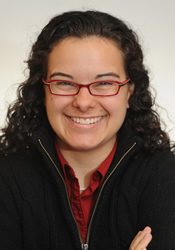
The Rev. Kate Murphey
COURTESY KATE MURPHEY
The Rev. Katie Murphey, associate pastor at Metropolitan Memorial United Methodist Church in Washington, says that congregation has "raised the bar" to help members take their vows more seriously.
"I did a lot of research that showed increasing expectations actually led to increased growth, specifically in closing the 'back door' of the church, where people come in and join, but then leave because they're not connected and not sensing any of the difference they expect to come from the church," she says.
To counteract that phenomenon, the church launched a 16-week membership program, still in its pilot phase, that asks prospective members to complete eight membership classes before they join and eight afterward. They must also practice ministry related to each vow.
"We're focusing on holistic stewardship of the good news," she says, "to make disciples who actually have their talk, walk, pocketbook, focus and skills proclaiming the value of shalom in word, action and presence."
Congregations teach that faithful practice through preaching, educating all ages, providing opportunities to participate in hands-on ministry, studying Scripture, living as examples for family and neighbors, and, Jung says, talking about "the ways God blesses and provides for us."
Alegría says there is no one way to teach stewardship, but everything should be biblically based and "applied as appropriate within the local congregation's context."
Barnes believes younger people particularly are getting the message.
"They understand that making a difference in the world is more important than making a difference in your banking account," he says. "When you look at what millennials want to do with their time, with their talents, I have great hope because they will be changing the culture."
That is good for the world and the soul, Jung says noting 1 Timothy 6:18, "They are to do good, to be rich in good works, generous, and ready to share, thus storing up for themselves the treasure of a good foundation for the future, so they may take hold of the life that really is life."
"I am grateful," Jung says, "for all disciples who have learned the joy of generosity in sharing."
Tita Parham is a writer, editor and communications consultant based in Apopka, Fla.
